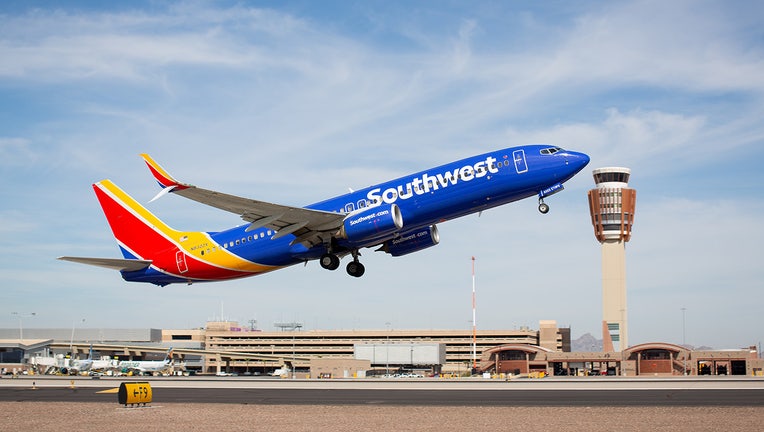Naked Woman on Southwest Flight Forces Plane to Return to Gate in Houston
In an incident that left passengers bewildered and delayed, a Southwest Airlines flight departing from Houston’s William P. Hobby Airport was forced to return to the gate after a female passenger disrobed and caused a disturbance. The incident, which occurred on a recent morning, has sparked a flurry of discussions about airline safety protocols, mental health support, and the challenges of managing unexpected in-flight incidents.
While details remain somewhat fragmented due to the ongoing investigation, eyewitness accounts and official statements paint a picture of a chaotic and unsettling situation. The flight, destined for an undisclosed location, was taxiing on the runway, preparing for takeoff when the incident unfolded. Passengers reported that a woman, who had boarded the plane normally, suddenly began to undress.
“It was just bizarre,” said one passenger who wished to remain anonymous. “Everything seemed fine, and then she just started taking off her clothes. People were shocked, of course. Nobody knew what to do.”
The woman’s behavior reportedly escalated beyond simple disrobing. Passengers described her as becoming increasingly agitated and disruptive, shouting and moving around the cabin. Concerned for the safety and well-being of everyone on board, the flight crew made the decision to return the plane to the gate.
Swift Response and Investigation
Upon returning to the gate, law enforcement officials boarded the plane and took the woman into custody. Southwest Airlines released a statement confirming the incident, stating that the flight was delayed due to a “disruptive passenger” and that the airline was cooperating with authorities.
“We commend our flight crew for their swift and professional response to this challenging situation,” the statement read. “The safety and comfort of our passengers and crew members are always our top priority.”
The FBI is reportedly involved in the investigation, as is standard procedure when incidents occur on board aircraft. Authorities are working to determine the underlying cause of the woman’s behavior, including whether mental health issues or substance use played a role.
Impact on Passengers
The incident caused significant disruption for the passengers on board. The flight was delayed for several hours, and passengers were required to deplane while the situation was addressed. Many expressed frustration with the delay but also acknowledged the necessity of ensuring the safety and security of the flight.
“It was definitely an inconvenience, but you can’t really argue with the decision,” said another passenger. “It was a strange and unsettling situation, and I think the crew handled it as best they could.”
Southwest Airlines provided passengers with accommodations and rebooked them on later flights. The airline also offered apologies for the inconvenience caused by the incident.
Questions Raised and Potential Contributing Factors
This incident raises several important questions about airline safety, passenger screening, and the increasing frequency of disruptive behavior on flights. While it’s impossible to know the exact circumstances that led to the woman’s actions, several potential contributing factors could be considered:
- Mental Health Crisis: It is possible that the woman was experiencing a mental health crisis at the time of the incident. Mental health issues can manifest in unpredictable ways, and air travel can be a stressful experience that exacerbates underlying conditions.
- Substance Abuse: While not confirmed in this case, substance abuse is a known factor in disruptive behavior on flights. Alcohol or drug intoxication can impair judgment and lead to erratic actions.
- Stress and Anxiety: Air travel itself can be a significant source of stress and anxiety for many people. Crowded airports, security checkpoints, and the fear of flying can all contribute to heightened levels of stress, which may trigger unusual behavior.
- Lack of Sleep: Sleep deprivation can also affect cognitive function and emotional regulation, potentially contributing to irrational or impulsive actions.
- Underlying Medical Condition: Although less likely, an undiagnosed or untreated medical condition could potentially contribute to the behavior.
Airline Protocols and Passenger Safety
Airlines have protocols in place for dealing with disruptive passengers, which typically involve de-escalation techniques, restraint (if necessary), and coordination with law enforcement. However, these protocols are often reactive, meaning they are implemented after an incident has already occurred.
The incident raises questions about whether more can be done to proactively identify and assist passengers who may be at risk of causing a disturbance. Enhanced screening procedures, mental health awareness training for flight crews, and improved access to mental health resources for passengers could potentially help prevent similar incidents in the future.
Table 1: Examples of Disruptive Passenger Incidents on Airlines
| Date | Airline | Incident Description | Location |
|---|---|---|---|
| March 2023 | United Airlines | Passenger attempted to open emergency exit mid-flight. | San Diego |
| July 2022 | JetBlue | Passenger assaulted a flight attendant after being asked to wear a mask. | Boston |
| January 2021 | American Airlines | Passenger refused to wear a mask and became verbally abusive towards crew members. | Miami |
| August 2020 | Delta Airlines | Passenger punched a flight attendant during a dispute over baggage. | Atlanta |
Table 2: Potential Contributing Factors to Disruptive Passenger Behavior
| Factor | Description |
|---|---|
| Mental Health Crisis | An acute episode of mental illness that can manifest in unpredictable and disruptive behavior. |
| Substance Abuse | Intoxication from alcohol or drugs, which can impair judgment and lead to erratic actions. |
| Stress and Anxiety | Heightened levels of stress and anxiety related to air travel, potentially triggering unusual behavior. |
| Lack of Sleep | Sleep deprivation affecting cognitive function and emotional regulation, contributing to irrational or impulsive actions. |
| Medical Condition | An undiagnosed or untreated medical condition that could potentially influence behavior. |
The Need for a Multi-Faceted Approach
Addressing the issue of disruptive passengers requires a multi-faceted approach that involves airlines, law enforcement, mental health professionals, and passengers themselves. This includes:
- Enhanced Training for Flight Crews: Providing flight crews with more comprehensive training on how to identify and de-escalate potentially disruptive situations.
- Improved Passenger Screening: Exploring options for enhanced passenger screening procedures that may help identify individuals at risk of causing a disturbance.
- Mental Health Resources: Making mental health resources more readily available to passengers, both before and during flights.
- Public Awareness Campaigns: Raising public awareness about the consequences of disruptive behavior on flights and the importance of respecting airline rules and regulations.
- Collaboration and Communication: Fostering better communication and collaboration between airlines, law enforcement, and mental health professionals.
Conclusion
The incident on the Southwest Airlines flight in Houston serves as a stark reminder of the challenges that airlines face in managing passenger behavior and ensuring the safety and security of flights. While the specific circumstances of this case remain under investigation, it highlights the need for a comprehensive approach to addressing disruptive behavior, which includes enhanced training for flight crews, improved passenger screening, and increased access to mental health resources. By working together, airlines, law enforcement, and passengers can help create a safer and more comfortable travel experience for everyone. As air travel continues to increase, addressing these issues proactively will become increasingly important.



